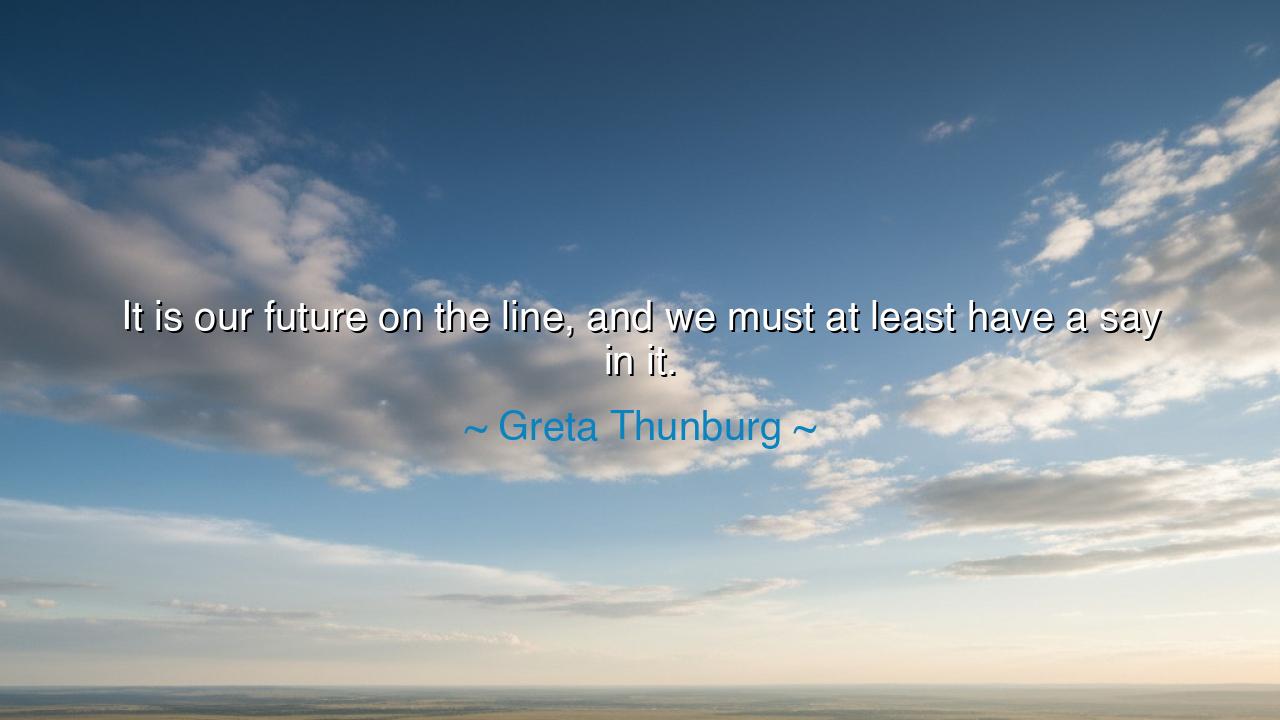
It is our future on the line, and we must at least have a say in






"It is our future on the line, and we must at least have a say in it." These powerful words from Greta Thunberg resonate like a clarion call for justice, responsibility, and empowerment in the face of looming crises. Thunberg, the voice of a generation, speaks not only for herself but for all who stand on the precipice of a future shaped by climate change, environmental degradation, and the reckless choices of the past. To her, the future is not a distant, abstract concept—it is something that is rapidly approaching, and it is our duty to engage in the decisions that will define it. In these words, we hear the ancient cry of the people who have stood up against the forces that seek to shape their destiny without their consent, for future generations are not mere inheritors of the world but active participants in its creation.
In the great tradition of the ancients, voices of dissent have always been a source of change. Consider the story of Socrates, who stood before his accusers in Athens, not merely as a teacher, but as one who demanded a say in the future of his society. Socrates, knowing the power of ideas, refused to be silenced or to accept a future shaped by forces beyond his control. He argued that every citizen has a duty to question and to act for the greater good, for without the active participation of the people, the future would be dictated by the whims of rulers, rather than by the wisdom of the collective. Greta’s words echo this ancient call—the future is too important to be left in the hands of the few; it must be shaped by the many, especially those who will live to inherit it.
In the same vein, Marcus Aurelius, the Roman emperor and Stoic philosopher, emphasized the importance of personal responsibility in the face of society’s challenges. He knew that each individual had the power to influence the world around them. In his Meditations, he wrote, “What we do now echoes in eternity.” The choices we make today, both small and large, shape the world we leave behind. For Aurelius, the future was not something to be feared or passively accepted, but something to be confronted with courage, wisdom, and an unwavering sense of duty. Similarly, Thunberg’s demand for a say in the future is not one of passive protest but an active call to arms—a challenge to everyone to take responsibility for the world we are leaving behind.
Consider the civil rights movement in the United States, where figures like Martin Luther King Jr. and Rosa Parks stood firm in their belief that the future of the country should not be dictated by systemic injustice. They demanded a say in the future, not just for themselves, but for all who had been silenced by inequality. Their struggle was not just for freedom in the present, but for a world in which future generations would live with dignity and equality. King’s “I Have a Dream” speech is an echo of Greta Thunberg’s urgency—both leaders called for the right to shape the future, to ensure that the children who follow would live in a world of justice, not one burdened by the injustices of the past.
The lesson from these examples is clear: we are not mere bystanders in the unfolding drama of life. Just as Socrates insisted on the necessity of speaking truth to power, and Martin Luther King Jr. demanded justice for those denied a voice, we, too, must take up the mantle of responsibility. We must recognize that the choices we make today—the way we treat the earth, the way we treat one another, the way we challenge injustice—will reverberate through time. The future is not something that will happen to us, but something we must actively shape. Thunberg’s words remind us that inaction is not an option, and passivity in the face of crisis is a betrayal to the generations that will follow.
Greta’s call for a say in the future is not just a plea for environmental action, but a deeper call to engagement, action, and collective responsibility. It is a reminder that we are stewards of the world, not its masters. We must ask ourselves: are we shaping the world we want to see, or are we letting it be shaped by the forces of greed, ignorance, and neglect? Whether in the fight against climate change, the pursuit of social justice, or the preservation of human rights, the future is ours to mold, but only if we choose to engage, to fight, and to speak out.
In practical terms, Greta’s words are a summons to action. If we want a future where the planet is preserved, where people are treated with respect and dignity, and where justice is not a privilege but a right, we must act now. Begin by engaging in community efforts, advocating for policy change, and supporting sustainable practices in all areas of life. Speak up when you see injustice, challenge those in power who seek to profit at the expense of others, and, above all, live in such a way that reflects your belief in the future you wish to see. The future is not an inevitable force, but a canvas on which we paint with our choices. Let us make those choices with courage, compassion, and a deep understanding of the responsibility we carry—not just for ourselves, but for generations yet to come.






AAdministratorAdministrator
Welcome, honored guests. Please leave a comment, we will respond soon